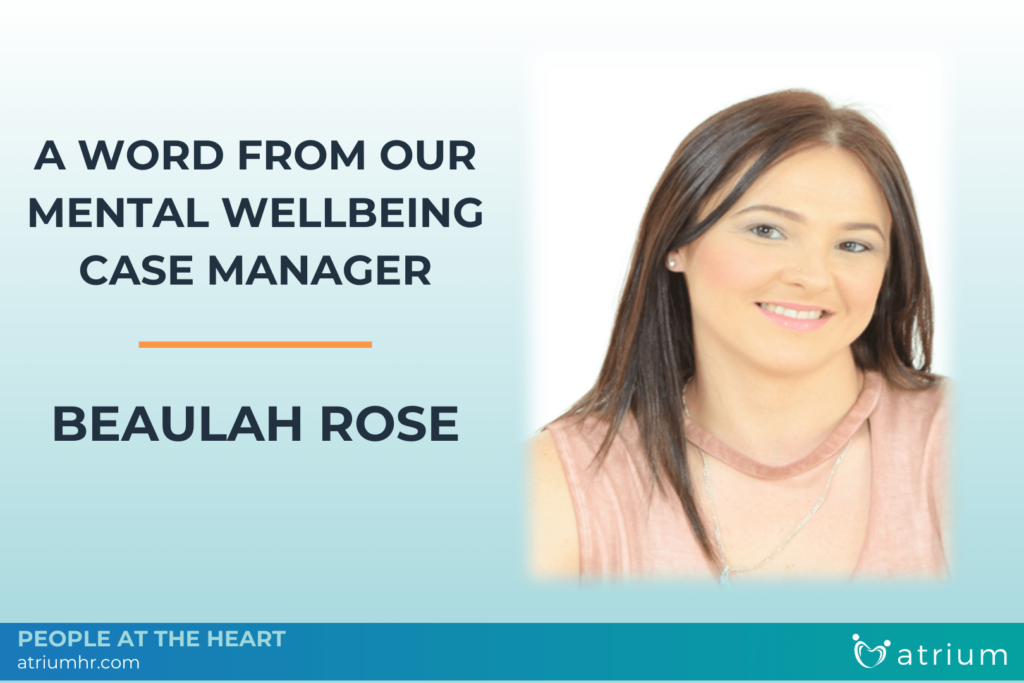A Word From Our Mental Wellbeing Case Manager, Beaulah Rose.

This month, we asked the Atrium team member who leads our therapy team to chime in about mental health in the workplace. Here are Beaulah’s thoughts.
Mental Health In The Workplace
Mental health has increasingly come into the spotlight following the COVID-19 pandemic, as employees are transitioning between remote work, hybrid office spaces and some are returning to full-time office-based work. The pandemic had a dramatic impact on employees and business owners alike, with more and more people recognising that they were struggling with varying aspects of their day-to-day life. The balancing act of juggling both home life and work, given the new working structures, has been difficult to navigate, more so than most had anticipated, and adjusting to constant change has largely amplified this already challenging dynamic. Some may argue that, while remote work has its pros, many have struggled with issues such as regularly taking breaks, general self-care, over extension of working hours and loss of the social aspect of working in an office (including access to support). These issues have largely contributed to challenges with handling burnout and stress management. Those in the hybrid working environment often find it difficult to manage the different workplaces and, for those who have returned to the office full-time, they often report challenges with working relationships and stress management leading to higher rates of employee conflict.
The impact of working spaces has a major overlap into the personal realm of employees’ lives, leaving most feeling stuck, abandoned and incapacitated, resulting in diminishing levels of overall mental wellbeing. As we approach World Mental Health Day, let’s look at some of the key features of mental health in the workplace and how we could all work towards contributing to healthier habits and routines, support structures and improved communication within the workplace that would organically also support individuals in their personal spaces as well.
Regulated and well-constructed working environments support good mental health by providing:
- a livelihood to support the individual and/or their family;
- a sense of confidence, motivation, purpose and achievement;
- an opportunity for positive relationships and inclusion in a community;
- a platform for structured routines and healthy habits; and
- working cultures promoting growth and development.
Safe and healthy working environments are not only a fundamental right but are also known to minimise tension and conflicts at work and improve staff retention, work performance and productivity which contributes to the overall outcomes of the organisation and overall wellbeing of its employees.

Risks to mental health at work
At work, psychosocial risks are documented relating to issues such as job content or work schedule, specific characteristics of the workplace (which can include the working environment – remote/hybrid/in office), and perceived support available or opportunities for career development. Other risks to mental health at work can include:
- under-use of skills or being under-skilled for work and being tasked with duties that fall outside an individual’s qualification and experience level and with minimal or limited training available;
- excessive workloads or work pace, often exacerbated by understaffing;
- long, unsocial or inflexible hours contributing to challenges with work-life balance or an inability to separate work and personal life altogether;
- unsafe or poor physical working conditions – this can also be extended to not having an adequate working space within the home environment, contributing to physical ailments that impact on the ability to work effectively;
- organisational culture that enables negative behaviours;
- limited support from colleagues, being micromanaged or authoritarian supervision;
- violence, harassment or bullying;
- discrimination and exclusion;
- unclear job role;
- under or over-promotion;
- job insecurity, inadequate pay, or poor investment in career development; and
- conflicting home/work demands.
Although psychosocial risks can be found in all sectors, some workers are more likely to be exposed to them than others. Health, humanitarian or emergency workers often have jobs that carry an elevated risk of exposure to adverse events, which can negatively impact mental health. Being aware of exposure to demands and stress factors within the working space is an important factor when considering how the organisation can protect their employees.
Taking action for mental health at work
Government, employers, organisations which represent workers and employers, and other stakeholders responsible for workers’ health and safety can help to improve mental health at work through action to:
- minimise work-related mental health conditions by preventing the risks to mental health at work;
- protect and promote mental health at work;
- support workers with mental health conditions to participate and thrive at work; and
- create an enabling environment for change.
Action to address mental health at work should be done with the meaningful involvement of workers and their representatives, and persons with lived experience of mental health conditions. This collaborative effort and information sharing can go a long way in addressing the specific needs of the organisation and their workers and employees. Protecting and promoting mental health at work is about strengthening capacities to recognise and act on mental health conditions at work, particularly for persons responsible for the supervision of others, such as managers.
To protect mental health, the World Health Organisation recommends:
- manager training for mental health, which helps managers recognise and respond to supervisees experiencing emotional distress in a gentle and patient manner; helps them to build on interpersonal skills like open communication and active listening; and fosters a better understanding of how job stressors affect mental health for different individuals and how they can be managed.
- training for workers in mental health literacy and awareness, to improve their knowledge of mental health and reduce stigma against mental health conditions at work, and to provide information on recognising the signs and symptoms of negative mental health or stress related symptoms with a toolbox of resources that can assist employees to seek remediating treatment and resolution before these symptoms impact on their mental health too negatively.
- interventions for individuals to build skills to manage stress and reduce mental health symptoms, including psychosocial interventions and opportunities for leisure-based physical activity.
For more information on Atrium HR Consulting’s Wellbeing Support Services, access your member portal or contact us here.



